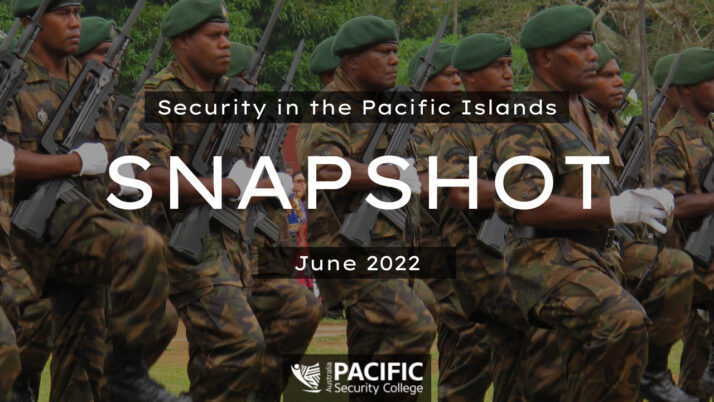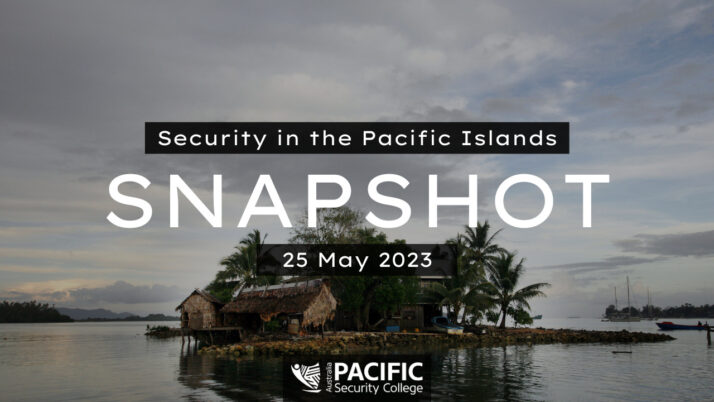Pacific Security Snapshot: 23 June 2022

A deal to preserve the Pacific Islands Forum was the major security story of the fortnight, while Fiji has offered a sobering reminder of the impacts of climate change to world leaders.
Pacific leaders have struck a deal to keep the Pacific Islands Forum (PIF) together, heralding a new era of cooperation for the body. Over a year after five Micronesian countries signalled their intention to leave the PIF, as a result of the election of current Secretary-General (SG) Henry Puna, key leaders flew to Suva with the aim of resolving the dispute.
Under the agreement discussed by Fijian Prime Minister (PM) Frank Bainimarama, Samoan PM Fiame Naomi Mata’afa, Cook Islands PM Mark Brown and Micronesian leaders, SG Puna will serve out his term until 2024. A Micronesian candidate will subsequently be appointed to an unprecedented five-year term. According to Federated States of Micronesia President David Panuelo, the agreement – which is to be ratified at July’s PIF leaders’ meeting – signals the end of a ‘big dark, dark cloud that has been hanging over the Pacific’.
At a high-level meeting outside the region, Fiji’s Defence Minister Inia Seruiratu warned world defence leaders at the annual Shangri La Dialogue (the Dialogue) that the biggest security threat facing the Pacific is climate change, not war. Seruiratu highlighted the ‘assault’ of climate change on the region and noted the ‘broadness’ of traditional and non-traditional security threats to the Pacific. These remarks come in light of a new report by the Vulnerable 20 group of nations (V20). The V20 found that globally, countries have suffered US$525 billion in climate-related loss and damage since 2000.
In other Pacific news from the Dialogue, French Defence Minister Sebastien Lecornu announced that Paris will bolster its presence in the South Pacific, expressing a commitment to the rule of law and individual sovereignty, regionally. This includes the deployment of new patrol boats in New Caledonia and French Polynesia, alongside a new multilateral defence exercise.
This comes in light of a recent French court decision to reject a request to annul the result of New Caledonia’s third independence referendum. The result of the third and final referendum provided for under the 1998 Noumea accord has been denounced as illegitimate by some following a boycott by pro-independence voters. In handing down their decision, the court said that the declaration of the Customary Senate – an assembly of the indigenous Kanak Councils – of a year of mourning in light of the COVID-19 pandemic, did not impact the “sincerity” of the ballot.
Turning to procurement news, the Papua New Guinea (PNG) Defence Force has received a new landing craft from the Australian Government through its Defence Cooperation Agreement. The ship, which should be operational by the PNG general election in July, will partially replace the country’s two recently retired Balikpapan class landing crafts.
Meanwhile, the Cook Islands have also received a new patrol boat from Australia. Dubbed the Te Kukupa II, it will replace the 33-year-old Te Kukupa, with Canberra also providing AU$1.6 million to upgrade the country’s Maritime Surveillance Centre in Rarotonga.
New Zealand extended its funding of the Pacific Maritime Safety Programme for a further four years, with the country providing NZ$12 million to the Cook Islands, Kiribati, Niue, Samoa, Tokelau, Tonga, and Tuvalu. Wellington has also sent two dog trainers to French Polynesia to assist customs officials in detecting illegal drug trafficking.
Looking north, The United States and the Marshall Islands have held their first in-person discussions in almost three years regarding their Compact of Free Association treaty. With the previous funding agreement set to expire in 2023, both sides are expected to meet throughout the remainder of the year, with the lingering legacy of American nuclear testing in the country at the top of the agenda.
Elsewhere in Micronesia, Palau was included in the United States’ Valiant Shield military exercise for the first time. As part of the agreement, Palau hosted the American Indo-Pacific Command joint forces, alongside the Northern Mariana Islands and Guam, for a 12-day biennial training exercise.
In environmental security news, Kiribati’s Government has declared a State of Disaster for the entire country due to drought. This has been brought on as a result of increased salinity levels in water exacerbating the country’s already below-average rainfall. Citizens have been advised to boil or use bottled water.
Finally, in Solomon Islands, the government has received World Bank funding to improve the management and sustainability of its fisheries sector.
Compiled by the team at the Pacific Security College, the Pacific security snapshot series highlights the human, environmental and traditional security developments that are shaping the region every fortnight. The information in this piece is accurate as of 9pm (AEST), Monday 20 June.
More Stories

Security Snapshot - 28 Mar 2024
Pacific Security Snapshot | 28 March 2024
Summary ➣ Heavy rains, floods, landslides and earthquakes batter the region ➣ Pacific submissions to the International Court of Justice (ICJ) on climate change responsibility ➣ Elections across the Pacific prompting changes to diplomatic relations and security arrangements ➣ Challenges for women in politics Climate Security Lives have been lost in PNG after a series…

Security Snapshot - 26 May 2023
Pacific Security Snapshot | 25 May 2023
The security stories shaping the region ➣ Papua New Guinea and the United States sign Defence Cooperation Agreement ➣ United States-Pacific Islands Forum Dialogue held in Port Moresby ➣ Pacific leaders meet Indian Prime Minister Narendra Modi ➣ Pacific call for climate finance breakthrough at UN session ➣ Tuvalu strengthens efforts against illegal, unreported and…






